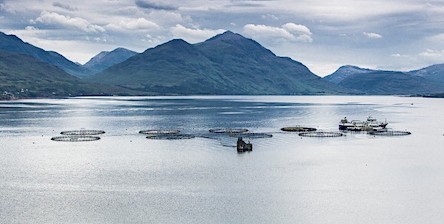Salmon Scotland — formerly the Scottish Salmon Producers Organisation (SSPO) — has protested strongly against huge rent increases for salmon farmers announced on Tuesday by Crown Estate Scotland (CES).
Salmon Scotland urged Mairi Gougeon, Cabinet Secretary for Rural Affairs and Islands, in a letter to halt the increases until the ongoing independent review of regulation in the industry is published.
Crown Estate Scotland announced what it called a comprehensive “root and branch” review of how Scotland’s seabed is leased for aquaculture.
CES said the review “has resulted in changes to rents as well as new reporting requirements on the use of plastics and, for finfish operators, participation in agreements to manage cumulative impacts.”
It said the review covered all aquaculture sectors and recommended rent and lease terms that “ensure rents fully reflect market value” and stressed that profits from rents paid to Crown Estate Scotland are passed to Scottish Government for public spending.
Salmon Scotland CEO Tavish Scott said: “Scotland’s salmon sector, employing 2,500 jobs in coastal and island communities, is very disappointed by Crown Estate Scotland’s arbitrary and total unjustified decision to almost double rents on salmon farms.
“CES presumably now see salmon like offshore wind — a cash cow to be exploited.
“We are today asking Cabinet Secretary Mairi Gougeon to halt this rise until the independent review of regulation is published, and Government assess professor Russel Griggs’ recommendations.
“Our members have paid more then £20 million into CES over the last five years — a charge which is set to almost double under this new framework.
“Scotland’s salmon farmers would be more likely to accept such a steep increase if they could see the benefit in terms of local investment of these charges.
“But, despite requests, CES have failed to give any indication as to how — or even if — this extra money will actually be used to help local people in the areas where it is raised.”
Crown Estate Scotland said the revised terms “support implementation of the Scottish Crown Estate Act 2019 specifically regarding managing assets in a way that maintains and enhances value, generates return and promotes sustainable development.”
Alex Adrian, Aquaculture Operations Manager at Crown Estate Scotland, said: “This review was essential to ensure that we keep up with the pace of an ever-changing sector.
“Aquaculture businesses sustain jobs in some fragile, remote communities and their operations impact the environment.
“We want to ensure that, in line with legislation, sustainable development is the core principle underpinning seabed leasing.”
Crown Estate Scotland said some of the key changes include:
- For finfish tenants, an increase in fees as a percentage of turnover “to reflect the consistently strong prices for salmon alongside a revised rent determination process that can better reflect market behaviour”
- For finfish tenants, reporting required on participation “in collaborative Management Agreements to mitigate cumulative impacts”
- For shellfish tenants, rents remain the same “other than an increase in minimum rents”
- For all tenants – reporting required on management of plastic used on the leased area
The changes to lease terms will come into effect in phases, starting in January 2023.
